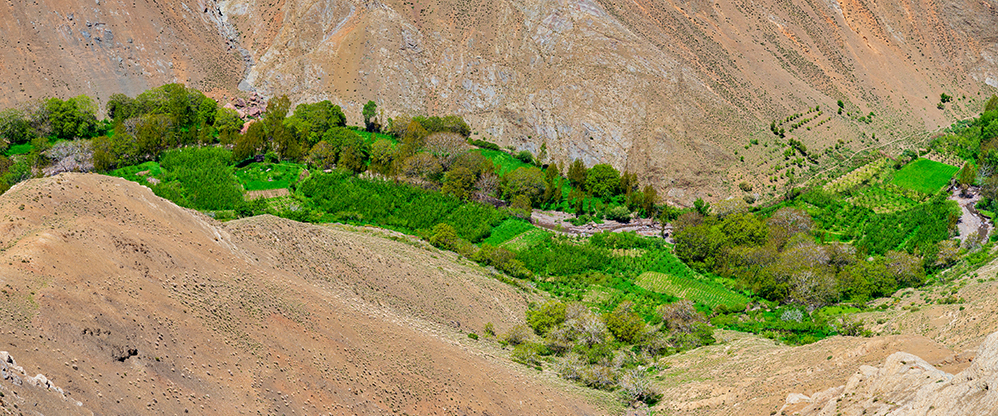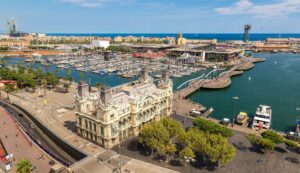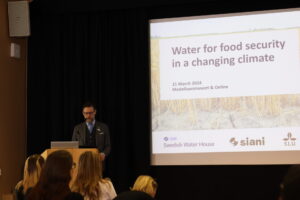- SIWI – Leading expert in water governance
- /
- Latest
- /
- Experts endorse the African Water Revolution
Experts endorse the African Water Revolution
In response to a “Call for an African Water Revolution”, over 80 experts participated in a workshop on the 27th-28th June 2018 in Kigali, Rwanda to identify what it takes to scale up green water investments across Africa and made significant commitments to seeing the process through.

The African Water Revolution is an emerging initiative to scale up green water and enhance rainfed agricultural solutions across Africa through financial investments and political leadership. The idea emerged from the 2016 Malin Falkenmark Symposium at World Water Week, where experts called for a revolution to alleviate the world water and hunger crisis.
Green water is infiltrated rainfall water which is stored in the upper layers of the soil and available to plant roots. Proven and cost-effective solutions can maximize the capture, storage and utilization of green water which enhance food production and reduce vulnerability to climate variability and climate change.
The workshop in Kigali was hosted by the Stockholm International Water Institute (SIWI), Stockholm Resilience Centre (SRC) and the Sustainable Development Goals Center for Africa (SDGC/A). During the event, participants from governments, multilateral, bilateral and academic institutions, philanthropic foundations and the private sector came together to identify barriers, test the concept and develop a vision for the African Water Revolution initiative.
During the keynote address, Mr. Jean Claude Kayisinga, Permanent Secretary, Ministry of Agriculture and Animal Resources of the Republic of Rwanda stated that the Government of Rwanda is committed to joining other African countries in establishing a mandate for the African Water Revolution. He highlighted the importance of the workshop saying “the mission of the Ministry of Agriculture and Animal Resources is to initiate, develop and manage suitable programs of transformation and modernization of agriculture and livestock to ensure food security and to contribute to the national economy. This mission cannot be achieved unless about 70% of Rwandan farmers engaged in rain-fed subsistence farming switch to green water use, which is already known as proven solution to fight hunger.”
Discussions during the workshop focused on how to scale up green water technologies, options for financing the African Green Water Revolution including a potential green water fund and how best to garner the support of African leaders and the donor community for this important initiative. The workshop was the first in a series of related events throughout 2018.
Participants agreed that the SDGs would not be achieved without more investment in the scale-up of green water technologies across the African continent and that green water is the red thread that connects the SDGs. H.E. Amina J. Mohammed, Deputy Secretary-General of the United Nations, sent a video message emphasizing the importance of green water for Africa and committing the United Nations to support Africa in accelerating the required transformation. “Scaling up green water investments could have a very important impact on ending and reversing these trends…[and] offer a practical, sustainable solution to the rural communities that form what is known as the ‘Invisible Majority’ in Sub-Saharan Africa,” said Ms Mohammed.
After the opening ceremony, the two-day workshop focussed on the challenges faced by Africa in terms of food security and what it will take to scale-up green water solutions across Africa. Participants identified best practices, local, regional and global barriers before exploring various financial approaches and establishing a set of funding principles. The second day focused on how to make the initiative happen with participants developing a vision, key success factors and identifying key players, partners and stakeholders.
To ensure that green water is a climate-smart, cost effective and sustainable approach to enhancing community-level resilience and food security in Africa, participants made seven recommendations on how the African Water Revolution should proceed:
Maximise the capture, storage and utilization of green water and rain-fed agriculture: this initiative must go beyond traditional rain-fed agriculture and manage rainfall variability by managing green water. Efforts must build on existing knowledge, applied technologies and best practices and the decades of experience that exists within small-scale farming in Africa.
Integrate green and blue water approaches and investments: supporting green water contributes to more effective blue water management, they are not mutually exclusive. Ensure an integrated approach by promoting the opportunities of green water in conjunction with and in support of blue water and overall watershed management.
Engage all stakeholders along agricultural value chains: an inclusive approach will need broad public awareness and support for green water and full engagement of local communities, local and national governments from agriculture, water and rural development and the involvement of the private sector. Green water investment will allow farmers to join these value chains by reducing seasonal failures and help move them into income generation.
Strengthen the business case for investing in green water: there is an emerging business case for greater green water investments and its role in improving water security in rural areas. Any business case must better address the complex and multi-faceted barriers including the required investment and cost, associated risk and the need for capacity building and institutional facilitation.
Develop innovative mechanisms and blended finance solutions: a comprehensive funding strategy will require innovative investment mechanisms and a robust portfolio of co-financing models with public and private funding. A key objective is long term sustainability but public finance will be needed to kick start the process.
Embed financial solutions into a broader sustainability strategy: establish context specific finance solutions that are inclusive, scalable and sustainable. This will include a supportive policy and regulatory context, knowledge, skills and education, extension services and commercial support for farmers to be able to invest in green water systems.
Leverage high level leadership and commitment: this initiative must build on existing efforts and garner high level support from political leaders. Increased understanding of the economic and social impact of the green water approach will help gain commitment from two or three countries to demonstrate leadership in this area.
In the closing panel, Dr. Belay Begashaw, Director General of the SDGC/A inspired participants by saying “all financial institutions have to make a commitment to work on resolving this issue. The political will is strong, but there is huge constraint on resources. We need to be creative in funding strategy. We need to look at good policies and blended finance solutions to unleash the potential for water system… We hope all the participants today can help align their institutions’ operations with this thinking.”
The workshop concluded that things must be done differently to achieve transformational change. Looking forward, the SIWI, SRC and SDGC/A will move beyond technical solutions towards a finance solution and are currently developing a theoretical framework indicating how the objectives of this initiative will be achieved. Advocacy and outreach will take place through autumn 2018 as the financial solution is defined including hosting arrangements, operational procedures, governments, sources of finances, access criteria and other operational details. This will lead to the High-Level Roundtable in early 2019 where stakeholders are invited to kick off the implementation phase of the African Water Revolution.








